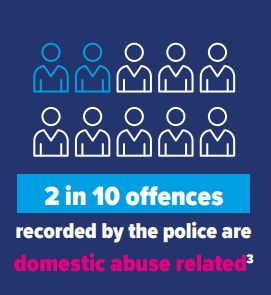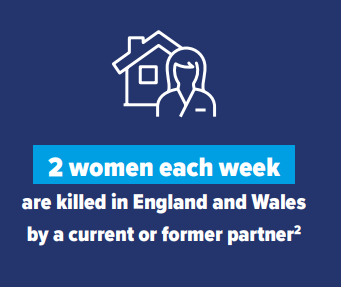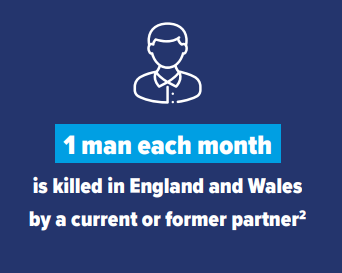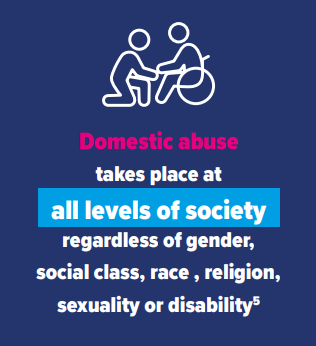Domestic Abuse
Workplace Training
About Our Workplace Training Courses
We offer both
Self paced e-learning courses
Onsite in person courses
Self- Paced
E-Learning
Domestic Abuse
Champion Training
We offer a self paced, inclusive, e-learning course which will educate HR Staff, Line Managers and Welfare Champions on how to respond to domestic abuse in the workplace. The course is approximately 4 hours of learning with a mixture of text, videos and infographics.
On completion of the course learners will be able to recognise the signs of domestic abuse, know how to respond to disclosures and where to refer employees for both internal and external specialist support and know how record correctly on employees HR files.
All learners will receive a CPD Certified certificate of completion and a domestic abuse champion logo
Self-Paced
E-Learning
Domestic Abuse Awareness Training
Our e-learning, self paced course educates employees to be able to recognise and respond appropriately to domestic abuse in the workplace
The course is approx 3 hours of learning with a mixture of text, videos and infographics.
On completion of the course learners will be able to recognise the signs of domestic abuse, know where to access both internal and external specialist support and know how to access company policies and procedures
All learners will receive a CPD Certified certificate of completion and a domestic abuse aware logo.
Onsite In Person
Domestic Abuse Workplace Training
We deliver face to face domestic abuse awareness training course for line managers and HR staff Welfare champions and general employees, in line with Government guidelines. Educating how to recognise, respond, refer and record.
We deliver face to face domestic abuse awareness for all employees, to make them aware of the issue and your company in house policy and procedures for supporting in the workplace.
We can bring the training to you. All our courses can be run on site at your workplace. All we need is a room with a screen.
Domestic Abuse Workplace Champion Training
HR Staff & Line Managers & Welfare Champions
AGENDA
- CPD Certified with certificate
On completion of the course
HR Staff/Line Managers will:
- Understand domestic abuse
- Understand the Domestic Abuse Act 2021 the types of abuse and associated crimes
- Understand the prevalence of domestic abuse
- Understand who it affects, cultivating an inclusive response
- Know how to spot signs of abuse & unhealthy relationships
- Understand the effects on adults and children
- Understand Clare’s Law, Domestic Abuse Disclosure Scheme
- Recognise signs of domestic abuse in an employee
- Respond appropriately to disclosures
- Refer to the appropriate support internally and externally
- Record details of a disclosure correctly and accurately
- Manage home workers correctly
- Implement practical domestic abuse workplace support
- Respond to perpetrators, safely
- Create or review workplace domestic abuse policies and procedures
Domestic Abuse Workplace Awareness Training
General Employees
AGENDA
- CPD Certified with certificate
On completion of the course
Employees will be able to:-
- Understand domestic abuse
- Understand the Domestic Abuse Act 2021 the types of abuse and associated crimes
- Understand the prevalence of domestic abuse
- Understand who it affects, cultivating an inclusive response
- Know how to spot signs of abuse & unhealthy relationships
- Understand the effects on adults and children
- Understand Clare’s Law, Domestic Abuse Disclosure Scheme
- Recognise signs in a friend or colleague
- Respond appropriately to a friend or colleague who is experiencing or who may disclose, domestic abuse
- Be aware of workplace domestic abuse policy & procedures
- Know who and where to refer to within the workplace
- Be aware of local and national support agencies
Testimonials
Excellent training. Sharne & Nic really engaging and informing. Delivered a tough topic sensitively and at the right pace.
Merseyside Fire & Rescue Service HR Manager
The online training on Domestic Abuse in the Workplace is powerful and essential. The course doesn’t just raise awareness—it empowered me as an individual and also my organisation to take meaningful action against domestic abuse.
Age UK Manager
Really insightful and eye opening training. Helped me to understand the signs and indicators of abuse which wasn't clear to me beforehand.
Merseyside Fire & Rescue Service SLT

“I considered it to be very interesting and provoked a lot of thought and consideration for victims, families, and the services available”
LJMU
“I thought the training was excellent, my favourite of the two week block.”
Merseyside Police Cadets
“Very good training session, the guest speakers got involved and interacted with the Learners and were very knowledgeable.”
Wirral Met College
Why is domestic abuse a workplace issue?
Good People Management
Being a good employer includes supporting staff through new or difficult periods in their lives.
Domestic abuse has a devastating impact on individuals and their families.
Office of National Statistics Reports
1 in 4 women & 1 in 6 men
will be a victim of domestic abuse in their lifetime
There are 2.3 Million Victims of Domestic abuse each year
2/3 of victims are female
1/3 of victims are male
People experiencing domestic abuse are often subject to disciplinary action and lose their jobs because their behaviour, being late for example or absenteeism, is misinterpreted.
Employers have a responsibility to provide all staff with a safe and effective work environment. For some employees the workplace is a safe haven and the only place that offers routes to safety.
Having a domestic abuse workplace policy and procedures, can clearly demonstrate domestic abuse is not tolerated
within or outside the workplace.
The Business Case
Supporting staff who have experienced or are experiencing domestic abuse makes business sense.
Not only will this be a reflection of good management practice but also corporate social responsibility.
In England and Wales
£14.1 billion: the estimated cost to the UK economy of lost output
due to decreased productivity, administrative difficulties from unplanned time off, lost wages and sick pay.
Domestic abuse can cause employees to be distracted at work, arrive late, leave early or miss work
and can increase employee turnover
An understanding and effective workplace policy to deal with the impact of domestic abuse will build a more nurturing and safer working environment for all staff, encouraging greater staff retention and importantly economic independence for those individuals living with or fleeing domestic abuse.
A Duty of Care
All employers have a duty of care and health and safety laws ensure workers have the right to work in a safe environment where risks to health and well-being are considered and dealt with efficiently.
An effective employer response is premised upon more awareness and better understanding of domestic abuse.
This includes being able to spot the signs of abuse, knowing how to respond to a disclosure from a member of staff or colleague and signpost to specialist domestic abuse and victims’ organisations and record details accurately.
ISO 45003
SO 45003 is the first global standard giving practical guidance on managing
psychological health in the workplace.
It provides guidance on the management of psycho-social risk, as part of an
occupational health and safety management system.
It supports organisations
who want to;
- build a positive working environment
- improve organisational resilience
- create a positive health and safety culture
- enhance performance and productivity
- reduce absenteeism
- Research from HR body CIPD finds less than a quarter of employees are aware of their employer’s policy or support available for domestic abuse
- Domestic abuse can negatively affect those abused as well as workplace colleagues around them.
- Domestic abuse frequently extends into work itself, with different surveys showing that between 36% to 75% of employed victims are harassed by abusive partners while at work.
- Domestic abuse can affect an employees ability to get to work as a result of their abusers actions, such as:
- Physical injury
- Physical restraint
- Car keys or money for public transport being hidden or stolen by their abuser.
- Purposeful refusal or failure to look after children creating problems getting to work
E: contact@nexusinsightacademy.co.uk
Company Registered Office
Enterprise House
Unit 5
The Courtyard
Old Court House Road
Wirral
CH62 4TZ
Company UTR
4723362051




